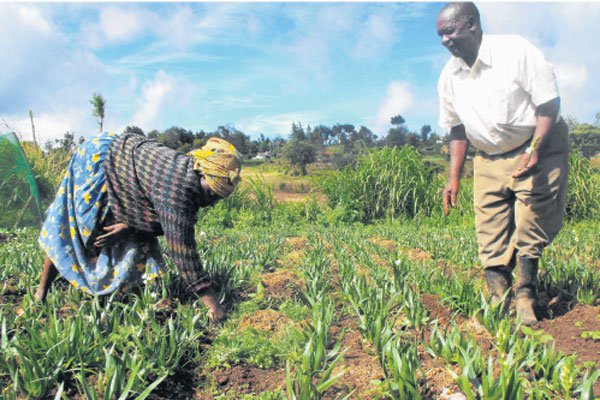A black net sitting on several posts and stretching on an eighth of an acre meets a visitor to Paul Watheru’s farm near Kireita forest in Kiambu County.
Underneath the net, there are several green leafy cabbages. Local farmers are wont to touch and squeeze them to determine if they are ready for harvesting.
“I will harvest them in about a month,” says Watheru, 73. It is hard to believe that the ground on which the vegetables are flourishing was a few months ago occupied by flowers.
Watheru and his wife, Margaret Wangari, mainly grow flowers, an agribusiness that they have engaged in since 2006, and sell the produce to Wilmar Flowers Ltd in Thika.
However, once they harvest the flowers after every three or six months depending on the variety, they rotate the crops with cabbages.
“It takes time before one weeds the flowers, thus, the ground gets compact. I grow the vegetables to help soften the area and improve the soil texture, health and curb diseases,” he explains.
The farmer has grown the Platon F1 variety of cabbages that he bought at Sh1,500 for a 25g pack. It only requires a fertile ground, water and is not easily attacked by diseases.
Before the cabbages, Watheru harvested Arabicum and Goblin, summer flower varieties which he says are “more or less like growing tomatoes or potatoes”.
The flowers only require adequate water and manure to grow well, with the climate favouring them.
“Their seeds resemble those of potatoes. I buy the seeds only during the first planting season. For the rest, I harvest, store for two months which allows for curing, and then I replant the next season.”
He first starts by sub-dividing his two acres land into 500 metre-squared plots that host 12,000 bulbs each. “My wife and I then prepare the land using double digging method that involves ploughing deeper to allow for aeration, water and nutrients to penetrate the soil.”
Thereafter, they make a metre wide beds. “We do this by raising the soil six inches from the ground to aid in proper drainage and, thereafter, add manure and plant immediately,” explains Margaret as she joins in the conversation.
Ephantus Mwai, an agronomist at Wilmar Flowers, says it’s important to conduct an analysis on the soil during land preparation. This helps to determine the soil type so that farmers can know whether to apply lime or gypsum.
The flowers require little water since they have bulb seeds susceptible to rotting but one must irrigate them twice per week if the weather is hot.
“We use the black net not only to help reduce the intensity of the direct sun but also prevent precipitation. When the area is cold or hot the farm will remain warm. The net also prevents the rainwater from directly hitting the fragile flowers,” says Watheru, who has two workers.
Mwai notes that with the summer flowers, the sun speeds up their maturity.
“The flowers are graded depending on their length. Exposing them to direct sunlight makes them mature quickly but they will not develop the needed length. Inside the chamber, it’s a little darker, thus, as the flowers struggle to reach the light outside, they grow taller at the required rate,” he explains.
“Besides, rotating the summer flowers with cabbages helps to eradicate diseases because they are not from the same family.”
Watheru, who was a potato and cabbage farmer before moving to flowers, says he harvests around 6,000 stems weekly that go for Sh3 each for three months, which earn him Sh.72,000 monthly.
After the three months, he takes a 30-day break, then adds manure in the garden while watering and weeding.
“It will take me a month before I start harvesting again for three months,” says the farmer.








